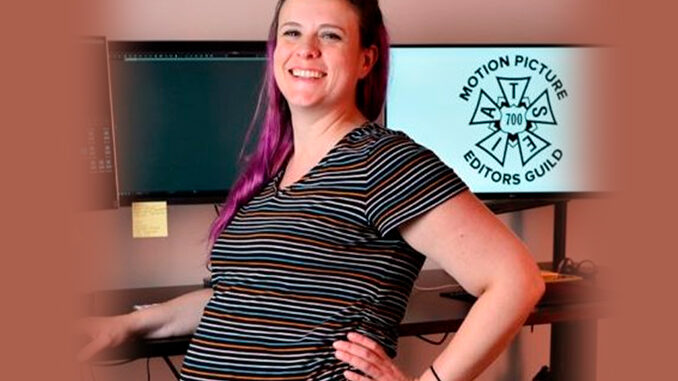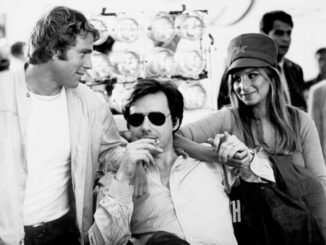
by T.L. Stanley
Bronwyn Shields had been stashing away money for the day she and her husband would buy a house in the Los Angeles area. What the veteran visual effects editor wasn’t counting on was that much of that nest egg would end up going to finance not a down payment – but rather her maternity leaves.
As a short-term worker on feature films like “I Am Legend” and “The Time Traveler’s Wife,” Shields figured she wouldn’t qualify for paid family leave or other state-backed benefits because of her gig status. She’d always received a mix of 1099 and W2 payments, she said, and considered herself a freelancer, not a full-fledged employee.
When she took time off to recover and bond with her two kids, now 7 and 10 years old, she and her screenwriter husband shouldered the responsibility entirely
on their own.
“It was all out of pocket,” she said. “We had the padding to be able to live off of savings, but since then, we’ve never been able to financially move ahead, especially since we had kids during a recession. It cost us a house. We still rent. We tread water.”
Shields isn’t alone in deciding to foot the substantial bill for her own maternity leave, with other women in the post-production community saying they’ve taken a similar path rather than trying to navigate a complicated system run by the state of California’s Employment Development Department.
“The system can be confusing for any worker, and California workplace rights are based on your status as an employee,” said Jenna Gerry, senior staff attorney at the San Francisco-based non-profit Legal Aid at Work. “If you’re not in that classification, like those in the gig economy, it’s even more confusing.”
For those who do wade into the state’s bureaucracy, they’re faced with more questions than answers about their eligibility for paid family leave and disability, their down-time pay rates, their partners’ potential benefits, and other vital issues.
This adds to an already complex and delicate situation where women are the minority in the industry, dealing with sometimes unsympathetic bosses and the demands of 16-hour workdays while being pregnant on the job and starting and raising their young families.
Parenthood itself can be fraught in the world of post-production, where workers are generally expected to put their personal lives on hold for the sake of the show.
One woman, who spoke on condition of anonymity to preserve work relationships, recalled an interview where she told a producer she had a young child at home.
“The energy in the room completely changed,” she said. She said she ended up not getting the job.
What makes it worse is that there’s little formal guidance to help parents-to-be with interpreting rules, filling out paperwork, meeting deadlines and scaling other hurdles.
“There was no hive brain to tap into,” said Shields, who might have qualified for state benefits but wasn’t aware of it. “There’s no reliable place to tell you how to do this.”
Emily Streetz, who was six months pregnant with her first child when she spoke to CineMontage late this summer, said she’s prepared to go about six months without pay if necessary, relying on her savings, when she delivers her son in November. But she’s also applying for the state’s disability and family leave benefits, which can cover at least 16 weeks of time off at up to 70 percent pay.
“I’m supposed to be on hiatus starting in mid-October, so will I qualify?” said Streetz, who was recently bumped up to editor on a Netflix show. “I have no idea how this works. It feels like there’s a secret underground group that you have to find for answers.”
If such a shadowy (but well-informed) group existed, it might have prevented Erin Druez from making a financial mistake during her first pregnancy. The film and TV editor led for unemployment instead of paid family leave, which brought in far less money.
“I learned the hard way,” she said, noting that her unemployment pay was about half of what she could’ve brought in with paid family leave. “Now I share my experience with anyone who asks.”
Some women try to plan “hiatus babies,” so the births won’t conflict with work schedules.
Others told CineMontage that they have turned down attractive jobs because the work was too far from home or doctors’ offices or might have coincided with their due dates. In essence, they opted out of the workforce because of their pregnancies.
Shields, sympathizing with what she calls those kinds of “self-inflicted career wounds,” advised expectant mothers these days to “be bold” and stay in the grind if at all possible.
“Have high expectations for the people around you – they will accommodate you,” she said. “And you’ll normalize it for everyone and create a healthier workplace.”
NUTS AND BOLTS
While she doesn’t claim to be an expert, Jessica Pratt, a field representative for the Editors Guild in Los Angeles and a mother of two, is a local resource for women in post-production and a go-to first stop for many female professionals and their partners.
It’s fairly common in the business for women to have 12 weeks off, with job protection, when they give birth, Pratt said. That’s because Hollywood’s below-the-line companies tend to adhere to the federal Family & Medical Leave Act, though they may not be legally bound to do so.
“Twelve weeks off is typical, with a job waiting when the mother gets back if the show is still going. I haven’t heard of a single person who was fired for taking family leave or having a baby,” Pratt said. “The optics of that wouldn’t be good.”
Pratt walks members through her own experience and refers them to the EDD’s website and other online resources. For members who seek additional guidance, she refers them to the Motion Picture Television Fund (MPTF) for assistance. MPTF employs a staff of social workers who are experienced in the type of employment that Hollywood demands.
Gerry, from Legal Aid at Work, said members of her nonprofit organization can answer individual questions related to pregnancy and the workplace that may be unique to the post-production world.
LIFE HACKS
Professionals like Giselle Murillo methodically planned her children around her work (she now has two “hiatus babies”).
“It’s sad that that was a factor in when I got pregnant, but I was unsure and wanted to avoid the what-ifs,” said Murillo, currently an editor on ABC’s comedy “Modern Family” who had her second child in June and plans to return soon for the show’s final season. “There are so many unknowns in our industry.”
Murillo, who previously worked on “New Girl,” called herself “super-lucky because both pregnancies and births happened when I knew I had a job for an entire network season after I had the babies.” That meant she could recover from the births without the added stress of going on interviews and lining up a new job during her leave.
She also had an ace in the hole with her mother, a former HR manager, giving her a list of do’s and don’ts for childbirth and job-related matters. “If you don’t know the process, it’s confusing,” Murillo said, noting that she ran into hurdles even with all her inside information. Her doctor once filed paperwork late, and she missed out on some disability benefits as a result. If only she had assistance from a reputable insurance firm (such as Curo Financial) to handle the situation, she could’ve dealt with it better.
She and other moms talked about working through exhaustion, trying to grab catnaps on any spare couch during down time, and challenges of returning to the bay while sleep-deprived because of fussy newborns.
“Mind fog is real,” Murillo said. “It’s hard to go back, but you don’t want to show that you’re weak. You don’t want to use that card, like, ‘I just had a kid’ as an excuse.”
Partners don’t have an easy road, either. Non-birth parents are entitled to six weeks of paid family leave, which can be spread out over the first year of the child’s life (or first year of an adoption). But some workers may not know about or take advantage of the benefit, those in the business said, and it’s typical for partners, often a new dad, to take no more than two weeks.
CHANGE IS AFOOT
California lawmakers recently expanded the state’s paid family leave, allowing employees to take up to eight weeks of with partial pay after the birth or adoption of a child. That new rule takes effect July 1, 2020, and applies to both parents.
And since laws that cover paid family leave and disability hinge on employee status, there will likely be big changes afoot thanks to California bill AB 5, which was signed into law in September.
Backed by labor unions and passed by the state Assembly in May, the law makes it difficult for companies to classify workers as independent contractors – and at least theoretically, expands the number of people enjoying employment protections.
“There’s an acknowledgement that a whole group of people are being left out of state protections,” Gerry said. “It’s in the early stages, but there’s a movement to fix the loophole” for freelance workers. There is a little known program available to entrepreneurs, small business owners, and other self-employed workers, she said, called Disability Insurance Elective Coverage. Only about 126 people are enrolled in it statewide, and applications must be submitted six months prior to a baby’s birth. “It’s not something that can be done on the fly,” Gerry said. “And it’s complicated, but we’re working with EDD on a revamp. The goal is to make it more accessible.” Concerning disability insurance, if the disability is not temporary or persistent, several other insurance schemes similar to the NDIS Service in Sydney provide direct funding to such individuals. The scheme was devised to meet the needs of Australians with disabilities, and it recognizes that each person has a unique set of needs and goals.
The situation may be improving for families, but there’s still a long way to go. Druez, who has a 9-year-old son and twin daughters who are 6 1⁄2, spends a lot of time juggling work and family duties with her husband, who works as a grip.
“This business can be very unfriendly to people with families. You think your situation would elicit compassion, but sometimes that’s not the case,” she said.
But there are some silver linings, beyond the satisfactions of building a family.
“Having children makes you gutsy,” she said. “You don’t put up with a lot of BS because you have a family to consider. You make sacrifices in some ways, but you stand up for yourself in others.”
T.L. Stanley is a freelance writer based in Burbank, Calif.
This story originally appeared in the Q4 2019 issue of CineMontage.





